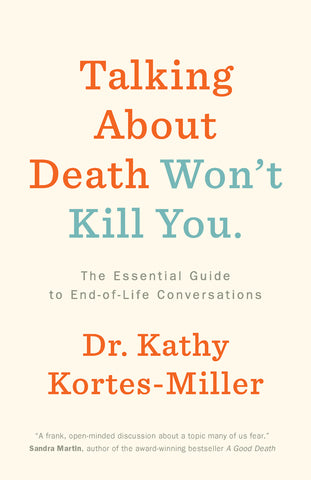We’re here with Dr. Kathy Kortes-Miller, the assistant professor at the School of Social Work and the Palliative Care Division Lead at the Centre for Education and Research on Aging and Health (CERAH) at Lakehead University. She is an unconventional death educator with a passion for palliative care and improving end-of-life care for all. We’ve asked her to answer a few questions about her new book, Talking About Death Won't Kill You: The Essential Guide to End-of-Life Conversations, which is in stores now! Check out the Q&A below.
- What are some takeaway tips for the first steps after a loss?
When someone you love has died, it can feel like your world has been rocked. It might be as if the world has shifted and you are struggling to regain your footing. My first tip would be for you to take some time to care for yourself and those closest to you who are also beginning to grieve the death. And when people ask you how they can help or offer support – let them! Let them feed you, shovel your walk, help care for your children. Allow them to do things that will let you take the time to lean into your grief as your understanding of what the death means to you moves from your head to your heart. Be gentle with yourself and those around you. Grieving takes time and work.
- Navigating family relationships in end-of-life situations can seem like a precarious balance beam. What are some ways we can make these hard decisions in a way that is respectful and understanding to everyone involved?
If only this was a simple answer! I remember working with a family who said that caring for their family member at the end of life was “bringing out skeletons in the closet that we didn’t know we had!” And they were referring to both the skeletons and the closets! I think the key here is to establish common ground. Families need to come together and recognize that they need to act in the best interest of the person who is dying. If there’s ever a time to come together and support one another, it’s now. Also, it is important to remember that if family members are called to make decisions on behalf of the person who is dying that they are not making the decisions they want for the person but rather making the decision that the person would want for themselves. This is an important distinction.
- There are many methods on how to talk to your kids about death. Can you talk about how this is discussed in the book?
In the book I try to use a series of stories to share examples of how to talk to young people about dying and death. I share a story from my clinical experience where I made a poor choice in the language I used and I also reflect on my experiences talking about dying with my own children when I was diagnosed with cancer.
(For more on this topic, check out her interview with The Globe and Mail!)
- How does one decide what they want to happen with their social media after they are gone?
This is something we should all be paying better attention to! Policies and laws are beginning to take shape around what happens to social media accounts after someone dies but in the meantime, consider following Facebook’s lead and choose someone to be your “legacy contact” for all you social media accounts. Provide that person with your passwords and instructions as to what you would like to happen with those digital spaces ie) memorialize your Facebook page, close your Twitter or Instgram etc. Just like you would for the person in charge of your estate, let them know that you are hoping that they will do this on your behalf and where to find your passwords!
- What are some tips on how to create a compassionate workplace?
Most of us spend a great deal of time at work and many of us are good at celebrating important life events. A compassionate workplace recognizes that there are important life events that may not be for celebrating but it is important that they are acknowledged or honoured For example, if your workplace celebrates birthdays, babies and weddings, consider also recognizing illness, caregiving and death. Just as a colleague is tasked with getting a card to celebrate an event and maybe a cake, consider assigning a colleague to make sure there is a card, a meal or a gift certificate to acknowledge the difficult times too. A compassionate workplace steps up for each other in times of need.
- Was there a part of the book that was hardest to write?
Some of the more personal parts were hard to write. For example, recalling talking about dying with my children.
- What prompted you to write this book?
Canadians are paying more attention to dying and death than ever before. Those of us working in palliative and end-of-life care are privileged to learn about dying and death in a way that most people are not. I wanted to be able to share some of this information and encourage Canadians to be empowered to see dying as an integral part of living. I also know that Canada is leading the way in how we care for people at the end of life so it was important to me to write this from the Canadian perspective.
- BONUS! What are you reading now?
I’m reading Son of a Trickster by Eden Robinson for my bookclub this month. It’s a poignant read of pain laced with moments of humour. #CanLit
---
Learn more about Talking About Death at www.ecwpress.com/talking-about-death.
